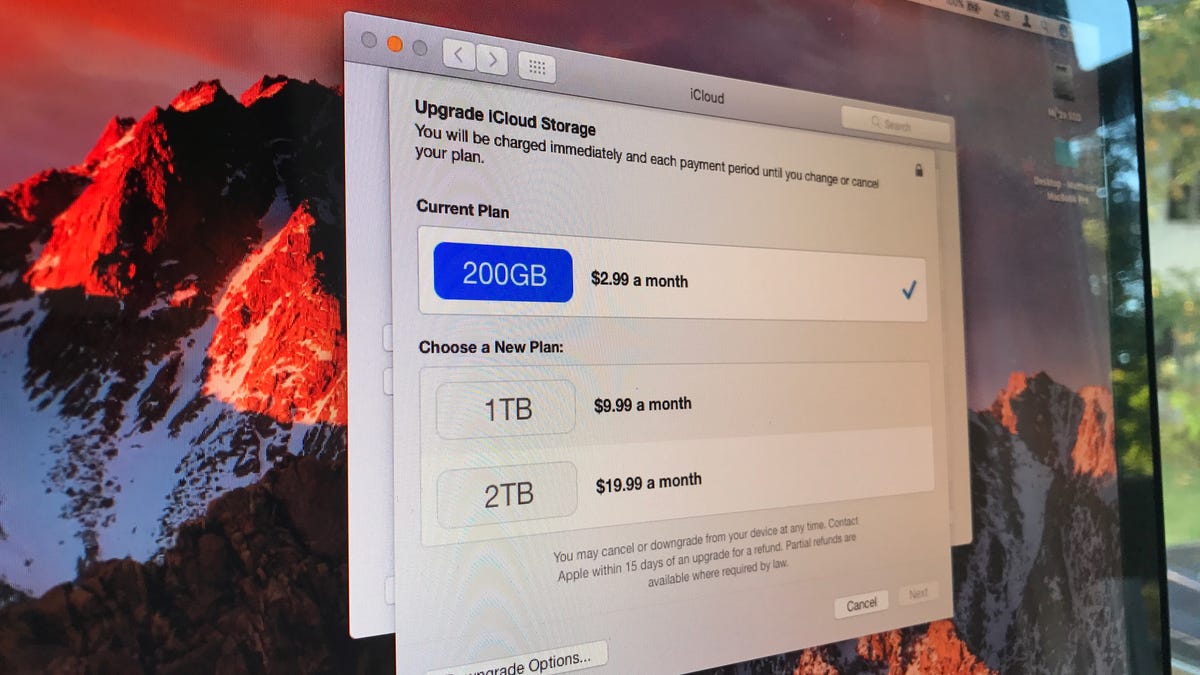Why a MacOS Sierra upgrade might cost you
Freeing up local storage on your Mac means more cloud storage might be needed. Learn how to upgrade your iCloud plan and what three alternative cloud services cost by comparison.

MacOS Sierra introduced two iCloud Drive features that are certainly convenient but are also certain to put you over the free 5GB iCloud storage limit. MacOS Sierra's ability to sync your Desktop and Document folders to iCloud Drive and to optimize your Mac's storage to free up some space will likely exceed 5GB sooner rather than later. An upgrade to MacOS Sierra might mean your iCloud Drive needs an upgrade.
You can upgrade your plan on an iOS device or a Mac. A plan is tied to your Apple ID and shared across your devices.
Apple offers 5GB for free and four paid plans:
- 50GB for $0.99 a month ((£0.79, AU$1.49)
- 200GB for $2.99 a month (£2.49, AU$4.49)
- 1TB for $9.99 a month (£6.99, AU$14.99)
- 2TB for $19.99 a month (£13.99, AU$29.99)
Upgrade iCloud on a Mac
To change your iCloud Drive plan on a Mac, open System Preferences and click iCloud. Next, click the Manage button in the lower-right corner. On the next window, click the Change Storage Plan button in the upper-right corner and select a new plan.
Upgrade iCloud on an iPhone
To change your iCloud Drive plan using an iOS device, go to Settings > iCloud and tap Storage. Next, click Change Storage Plan and select a new plan.
iCloud alternatives
While Apple's increased iCloud integration with MacOS Sierra is convenient, it's not the only cloud game in town. Apple's pricing, however, is competitive with the paid plans for Dropbox, Google Drive and Microsoft OneDrive.
Dropbox provides 2GB of free space but you can quickly accumulate more free space by referring friends, installing Dropbox on some devices and simply completing Dropbox's Getting Started guide. (I'm up to 55.5GB of free Dropbox storage, though a large chunk of that (48GB) came by way of a Samsung promotion when I installed Dropbox on a Samsung tablet.)
Dropbox has only one paid plan for individuals and pricing is the same per month as iCloud. Dropbox Pro provides 1TB of storage for $9.99 a month (£7.99, AU$13.99), but you'll get two months free if you pay upfront for the year. The annual plan costs $99 (£79, AU$139 )
Google Drive offers 15GB of free storage. It offers a number of paid plans:
- 100GB for $1.99 per month (about £1.58, AU$2.63)
- 1TB for $9.99 per month (about £7.92, AU$13.18)
- 10TB for $99.99 per month (about £79, AU$132)
- 20TB for $199.99 per month (about £159, AU$264)
- 30TB for $299.99 per month (about £238, AU$396)
Microsoft offers 5GB of free OneDrive storage and a paltry 50GB for $1.99 per month (about £1.58, AU$2.63). An Office 365 personal subscription (for a single user), however, includes 1TB of storage space for only $6.99 a month (about £5.54, AU$9.22) along with Word, Excel and other Office apps.
For more, read our full review of MacOS Sierra and learn how to use Sierra's new features.

